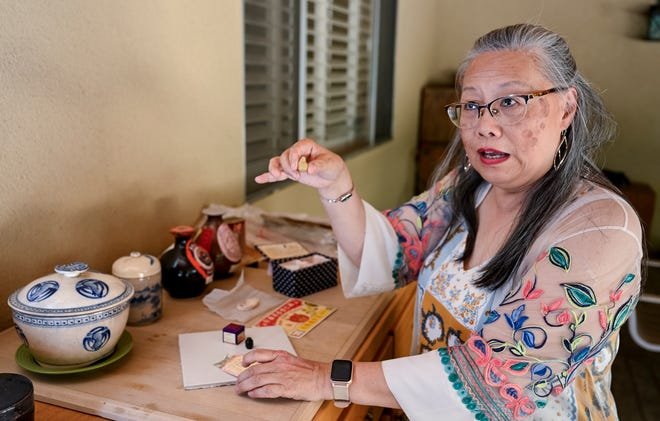As she prepares for the 30th anniversary of her integrative medicine centre, Dr Kah May Kwong has pulled out some ancient Chinese medicines prescribed by her father.
She found a glass jar of deer antler bark from her father’s medical clinic and pharmacy in Hong Kong, crushed into a white powder and preserved in a wax seal, that was used for its natural stem cell therapy and regenerative properties.
“The Chinese labels say the reindeer antlers are ‘from the north,’ meaning Russia or Siberia,” Kwon said. “My father was an immigrant in the 1960s and would load these medicines onto ships making long ocean crossings.”

Kwong is the third generation of her family to practice traditional Chinese medicine (her daughter is the fourth), and her father’s collection includes many other natural herbs and potions.
These include tiny crushed seahorses, large chunks of cinnamon bark, snake skin and, most intriguingly, bear gallbladders that her father has scraped off to mix into herbal medicines.
“Animal products are now too expensive to use,” Kwon said.
All of the herbs she uses are plant-based.
“Each part of the plant has a different use and every herb has to be tested by five agencies, including the FDA and USDA,” she said.
Kwong will be conducting workshops on various aspects of traditional Chinese medicine at an open house celebrating the anniversary of the center’s opening on June 29. The event will include a slideshow highlighting the history of her family’s practice, demonstrations and door prizes.
The public is welcome to attend the celebration.

Commonly misunderstood
With a history spanning more than 3,000 years, Chinese medicine is very different from Western medicine: it is completely natural and holistic, treating the whole body rather than specific parts – something that can be difficult for Western doctors and patients to understand.
In America, when we think of Chinese medicine, we primarily think of acupuncture, but in China, acupuncture is used as a treatment of last resort.
Western medicine is now being used in the East, but traditionally the Chinese do not like invasive techniques (such as acupuncture needles) and instead use herbs, nutrition, cupping, scraping, different types of massage, relaxation and exercise.
“Americans are used to medical procedures,” Kwon said. “They like acupuncture.”
But along with their acupuncture treatment, her patients also go home with herbs to brew into a tea.
In acupuncture, there are 361 pressure points to learn about. Still, learning to prescribe the perfect herb for each person is much more difficult, Kwon says.

A female doctor?
When Kwong was growing up in Hong Kong, her siblings and male cousins were all lined up and tested by the masters. None of them were deemed suitable to train as doctors, but little Ka Mei was.
“This girl has a gift, they told my father. She has a healer’s hands,” she said, “so they raised me.”
She was in fourth grade when her family moved to San Francisco, where her father opened a medical practice in Chinatown, and her school insisted she change her name to Karina.
She attended San Francisco State University for her pre-med studies, winning a scholarship reserved for women to study medicine, but the scholarship was for pharmacy, so Kwong’s first medical degree was as a pharmacist. She then enrolled in the first traditional Chinese medicine school in the United States and did her residency in Hong Kong.
When she came to Visalia, herbal medicine was not well known. She worked from home and saw about three patients a week. To make ends meet, Kwon worked as a pharmacist and traveled to the Bay Area on weekends to teach herbal medicine.
The largest center
In 1984, Kwon opened the Integrative Medicine Center.
We are now the largest independent, full-service Traditional Chinese Medicine clinic in the South Valley. We call it “traditional” because we follow accepted medical methods and have a proven explanation for its effectiveness.
“We also have a naturopathic pharmacy, which most clinics don’t have,” Kwon said.
She holds workshops on topics such as natural ways to lower blood pressure. As an accredited teaching facility, the center welcomes trainees from all specialties to deepen their understanding of traditional Chinese medicine.
Kwon also founded the Asia Cultural Association, which holds annual Lunar New Year celebrations and the Mid-Autumn Festival.
Patients notice several ancient medicines used by Kwong’s father in his Hong Kong practice hanging on the clinic’s walls, a testament to what is known as one of the world’s oldest medical systems.

General Medical Center 30Number Anniversary Open House
- Date and time: Saturday, June 29th, 10am to 12pm
- Location: 816 W. Oak Ave., Visalia
- For more information: 559 625-4246 or www.allholisticmed.org

